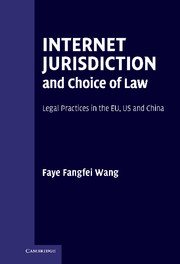Book contents
- Frontmatter
- Contents
- Preface
- List of Abbreviations
- Table of Cases
- PART I Introduction
- PART II Jurisdiction
- 2 Jurisdiction in electronic contracting
- 3 EU rules applied in cyber jurisdiction
- 4 US jurisdiction tests employed in e-contracting disputes
- 5 Chinese legislation on jurisdiction
- PART III Choice of law
- PART IV Online dispute resolution
- PART V The future
- Appendix 1 Council Regulation (EC) No 44/2001 of 22 December 2000 on jurisdiction and the recognition and enforcement of judgments in civil and commercial matters (Brussels I)
- Appendix 2 Regulation (EC) No 593/2008 of the European Parliament and of the Council of 17 June 2008 on the law applicable to contractual obligations (Rome I)
- Bibliography
- Index
3 - EU rules applied in cyber jurisdiction
from PART II - Jurisdiction
Published online by Cambridge University Press: 03 May 2011
- Frontmatter
- Contents
- Preface
- List of Abbreviations
- Table of Cases
- PART I Introduction
- PART II Jurisdiction
- 2 Jurisdiction in electronic contracting
- 3 EU rules applied in cyber jurisdiction
- 4 US jurisdiction tests employed in e-contracting disputes
- 5 Chinese legislation on jurisdiction
- PART III Choice of law
- PART IV Online dispute resolution
- PART V The future
- Appendix 1 Council Regulation (EC) No 44/2001 of 22 December 2000 on jurisdiction and the recognition and enforcement of judgments in civil and commercial matters (Brussels I)
- Appendix 2 Regulation (EC) No 593/2008 of the European Parliament and of the Council of 17 June 2008 on the law applicable to contractual obligations (Rome I)
- Bibliography
- Index
Summary
Overview of the EU jurisdiction rules
In the EU, the EC Directive on Electronic Commerce neither establishes additional rules on private international law nor deals with the jurisdiction of courts. Since the EC Directive on Electronic commerce does not cover Internet jurisdiction, the Brussels I Regulation, which is based on the old Brussels Convention, performs its role in the absence of the relevant legislation. The Brussels I Regulation is directly applicable throughout the participating member states. Moreover, the Brussels I Regulation applies in the new member states as part of the acquis communautaire, thus the Brussels I Regulation extended to the ten new EU member states on their accession in 2004, and to two more EU member states in 2006.
The Report on the Application of the Brussels I Regulation by the European Commission on 21 April 2009 considered the Brussels I Regulation to be:
a highly successful instrument, which has facilitated cross-border litigation through an efficient system of judicial cooperation based on comprehensive jurisdiction rules, coordination of parallel proceedings, and circulation of judgments. The system of judicial cooperation laid down in the Regulation has successfully adapted to the changing institutional environment (from intergovernmental cooperation to an instrument of European integration) and to new challenges of modern commercial life.
The Brussels I Regulation plays a very significant role in harmonising judicial cooperation between member states and its achievement in facilitating cross-border litigation cannot be undermined.
- Type
- Chapter
- Information
- Internet Jurisdiction and Choice of LawLegal Practices in the EU, US and China, pp. 35 - 64Publisher: Cambridge University PressPrint publication year: 2010



